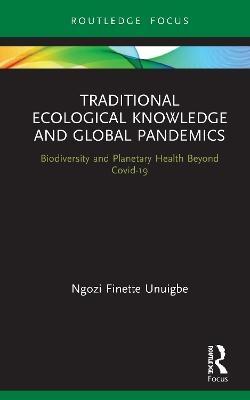
Traditional Ecological Knowledge and Global Pandemics
Biodiversity and Planetary Health Beyond Covid-19
Seiten
2021
Routledge (Verlag)
978-0-367-69294-0 (ISBN)
Routledge (Verlag)
978-0-367-69294-0 (ISBN)
This book demonstrates the importance and potential role of Traditional Ecological Knowledge in foreseeing and curbing future global pandemics.
The reduction of species diversity has increased the risk of global pandemics and it is therefore not only imperative to articulate and disseminate knowledge on the linkages between human activities and the transmission of viruses to humans, but also to create policy pathways for operationalizing that knowledge to help solve future problems. Although this book has been prompted by the COVID-19 pandemic, it lays a policy foundation for the effective management or possible prevention of similar pandemics in the future. One effective way of establishing this linkage with a view to promoting planet health is by understanding the traditional ecological knowledge of indigenous peoples with a view to demonstrating the significant impact it has on keeping nature intact. This book argues for the deployment of traditional ecological knowledge for land use management in the preservation of biodiversity as a means for effectively managing the transmission of viruses from animals to humans and ensuring planetary health. The book is not projecting traditional ecological knowledge as a panacea to pandemics but rather accentuating its critical role in the effective mitigation of future pandemics.
This book will be of great interest to students and scholars of traditional ecological knowledge, indigenous studies, animal ecology, environmental ethics and environmental studies more broadly.
The reduction of species diversity has increased the risk of global pandemics and it is therefore not only imperative to articulate and disseminate knowledge on the linkages between human activities and the transmission of viruses to humans, but also to create policy pathways for operationalizing that knowledge to help solve future problems. Although this book has been prompted by the COVID-19 pandemic, it lays a policy foundation for the effective management or possible prevention of similar pandemics in the future. One effective way of establishing this linkage with a view to promoting planet health is by understanding the traditional ecological knowledge of indigenous peoples with a view to demonstrating the significant impact it has on keeping nature intact. This book argues for the deployment of traditional ecological knowledge for land use management in the preservation of biodiversity as a means for effectively managing the transmission of viruses from animals to humans and ensuring planetary health. The book is not projecting traditional ecological knowledge as a panacea to pandemics but rather accentuating its critical role in the effective mitigation of future pandemics.
This book will be of great interest to students and scholars of traditional ecological knowledge, indigenous studies, animal ecology, environmental ethics and environmental studies more broadly.
Ngozi Finette Unuigbe is a researcher in international environmental law, policy and ethics whose research engages the stewardship ethic of indigenous knowledge, within the context of biodiversity conservation. She is currently a Professor at the University of Benin, Nigeria.
1. Pandemics and the Environment 2. Why Traditional Ecological Knowledge Matters 3. Complementarity of Traditional Ecological Knowledge and Mainstream Science 4. Restoring Land, Community and Health 5. Synergizing TEK and Mainstream Science to Promote Planetary Health
| Erscheinungsdatum | 09.03.2021 |
|---|---|
| Reihe/Serie | Routledge Focus on Environment and Sustainability |
| Zusatzinfo | 1 Tables, black and white; 1 Line drawings, black and white; 1 Illustrations, black and white |
| Verlagsort | London |
| Sprache | englisch |
| Maße | 138 x 216 mm |
| Gewicht | 500 g |
| Themenwelt | Studium ► Querschnittsbereiche ► Epidemiologie / Med. Biometrie |
| Naturwissenschaften ► Biologie ► Ökologie / Naturschutz | |
| Naturwissenschaften ► Biologie ► Zoologie | |
| Technik ► Umwelttechnik / Biotechnologie | |
| ISBN-10 | 0-367-69294-5 / 0367692945 |
| ISBN-13 | 978-0-367-69294-0 / 9780367692940 |
| Zustand | Neuware |
| Informationen gemäß Produktsicherheitsverordnung (GPSR) | |
| Haben Sie eine Frage zum Produkt? |
Mehr entdecken
aus dem Bereich
aus dem Bereich
ein überfälliges Gespräch zu einer Pandemie, die nicht die letzte …
Buch | Hardcover (2024)
Ullstein Buchverlage
24,99 €


